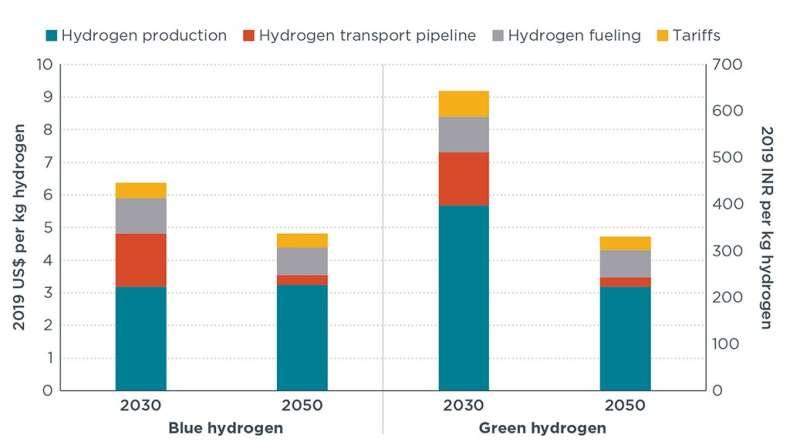Estimating the future cost of hydrogen fuel for transport in India

A mid-level outlook for the at-the-pump price of "green" hydrogen produced from water electrolysis powered by solar electricity in India declines to around $5 per kilogram (kg) hydrogen (or INR 350 per kg hydrogen) in 2050, according to a new study from the International Council on Clean Transportation (ICCT). Additionally, in an optimistic scenario, the price could be as low as $3.5 per kg (or INR 245 per kg hydrogen) in 2050.
"Green hydrogen produced from 100% additional renewable electricity has almost zero greenhouse gas emissions and this study illuminates how exploiting economies of scale can drive down costs," said Stephanie Searle, director of ICCT's fuels program. "It has the potential to significantly decarbonize transport."
In the optimistic scenario, the production cost of green hydrogen is projected to be approximately 40% cheaper than under the mid-level outlook, as a result of significant reduction in the electrolyzer's capital cost. Results also show that the levelized transport cost through pipeline can decrease by 80% between 2030 and 2050 due to a nearly tenfold increase in assumed annual hydrogen demand.
"Grant funding and favorable tax policies for green hydrogen production, along with programs that support early market development of hydrogen pipeline infrastructure and fuel cell electric vehicle manufacturing are going to be important for improving the financial viability," said Yuanrong Zhou, an ICCT fuels researcher and co-author of the study.
Researchers additionally modeled "blue" hydrogen produced from natural gas combined with carbon capture and storage in India. The study assumes the same fueling configuration and transport via pipeline for both pathways. While green hydrogen is more expensive than blue hydrogen in the near term, the economics of green hydrogen are better in the long term because the production cost for green hydrogen keeps decreasing, while the price of natural gas rises. "The assumed drop in green hydrogen production costs is underpinned by the recent record-low solar auction prices in India, which are themselves reflective of the variety of cross-sector policies the Indian government has implemented to support its ambitious renewable generation targets," said Zhou.
More information: Publication: theicct.org/publication/india- … hydrogen-cost-jan22/

















